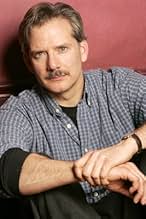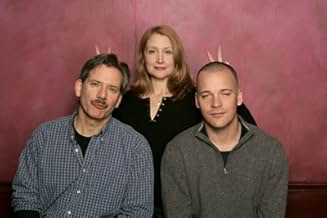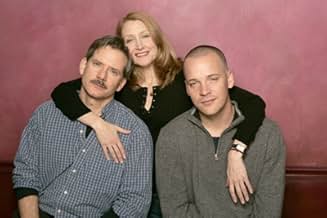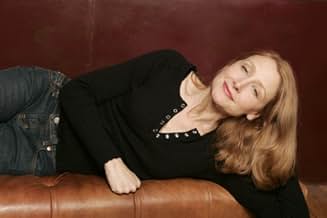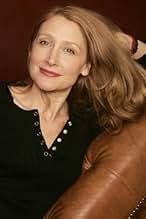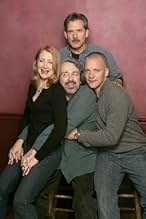VALUTAZIONE IMDb
6,4/10
2523
LA TUA VALUTAZIONE
Aggiungi una trama nella tua linguaA grief-stricken screenwriter unknowingly enters a three-way relationship with a woman and her film executive husband - to chilling results.A grief-stricken screenwriter unknowingly enters a three-way relationship with a woman and her film executive husband - to chilling results.A grief-stricken screenwriter unknowingly enters a three-way relationship with a woman and her film executive husband - to chilling results.
- Regia
- Sceneggiatura
- Star
- Premi
- 1 vittoria e 2 candidature totali
Craig Hamrick
- Party Guest
- (voce)
- (non citato nei titoli originali)
Jason-Shane Scott
- Robert's Masseuse
- (non citato nei titoli originali)
Bridgetta Tomarchio
- Female Guest
- (non citato nei titoli originali)
Recensioni in evidenza
First off, the less you know about this movie before seeing it, the better. Go in clean. And just let it such you in. Here are a few things you CAN know. (a) The screenwriter/director, Craig Lucas, is gay but wrote his best known play, PRELUDE TO A KISS, about a straight relationship that has overtones of homosexuality. (b) Patricia Clarkson may be the finest actress of her age. She flits around the first 20 minutes of this movie in a bra and panties, toyingly svelt but with a panther-like quality you only realize later. (c) This is a movie without a protagonist or an antagonist -- or more accurate, a movie in which each of the main characters take turns at being the antagonist and protagonist. (d) Despite the gay aspects, this is really a movie about betrayal, and it is fiendishly mean (but in a good way). (e) Peter Sarsgaard has never looked handsomer. (f) That's all you need to know. See it.
Suppose you had intimate knowledge about someone, and that someone did not know that you knew. How would you use that knowledge? Or would you? This issue is the undercurrent that carries the film's plot, like a fast moving stream, over a cliff, to a swirling, uncontrollable emotional vortex that changes people's lives forever.
Set in modern Los Angeles, a grieving gay screenwriter named Robert (Peter Sarsgaard) meets with Jeffrey (Campbell Scott), a wealthy film producer, to talk about Robert's script "The Dying Gaul", a tribute to his deceased lover and soul mate. Jeffrey invites Robert to his mansion by the ocean to meet his wife Elaine (Patricia Clarkson), who reads Robert's script and loves it. Over time, Robert and Elaine become friends, which sets up a triangular relationship that careens out of control when the anonymity of internet chat rooms provides cover for the discovery of secrets.
Artsy in tone and philosophy, the film exudes New Age dialogue, with conversation about Buddhist Karma, "the middle way", enlightenment, and deadly plant roots. The film's production design is chic. And while the color cinematography is mostly conventional, sometimes it is beautifully stylistic. I really liked those stark human silhouettes against that orange screen. The film's score, which connotes New Age spiritualism, is terrific.
Acting of the three leads is quite good. Patricia Clarkson is great as she sits in front of a computer monitor and, without speaking, displays myriad emotions through her facial expressions alone.
The chat room scenes are creative and emotionally potent, amid magnified keyboard clicking sounds. The back and forth exchange here is unusual, and striking in that it is meaningless when taken out of context, but highly enlightening when considered in relation to the film's plot, as this sample shows: "Hello"; "I hear clicking"; "I'm still here"; "Are you still there?"; "Yes"; "You sound really distracted"; "Yeah today"; "When?" "I'm sorry"; "No, I'm all yours"; "Are mine what?"; "No"; "Yes"; "Meaning?"; "I'm all yours now".
The film's screenplay does contain a rather obvious plot hole. And a couple of scenes involving Robert's son and former wife are too tangential to the story's trajectory. But these are minor issues.
"The Dying Gaul" may seem artistically or philosophically pretentious to some viewers. But I really liked it. Quite aside from the wonderful performances and the chic production values, the film's story has thematic depth, a quality lacking in most mainstream Hollywood films.
Set in modern Los Angeles, a grieving gay screenwriter named Robert (Peter Sarsgaard) meets with Jeffrey (Campbell Scott), a wealthy film producer, to talk about Robert's script "The Dying Gaul", a tribute to his deceased lover and soul mate. Jeffrey invites Robert to his mansion by the ocean to meet his wife Elaine (Patricia Clarkson), who reads Robert's script and loves it. Over time, Robert and Elaine become friends, which sets up a triangular relationship that careens out of control when the anonymity of internet chat rooms provides cover for the discovery of secrets.
Artsy in tone and philosophy, the film exudes New Age dialogue, with conversation about Buddhist Karma, "the middle way", enlightenment, and deadly plant roots. The film's production design is chic. And while the color cinematography is mostly conventional, sometimes it is beautifully stylistic. I really liked those stark human silhouettes against that orange screen. The film's score, which connotes New Age spiritualism, is terrific.
Acting of the three leads is quite good. Patricia Clarkson is great as she sits in front of a computer monitor and, without speaking, displays myriad emotions through her facial expressions alone.
The chat room scenes are creative and emotionally potent, amid magnified keyboard clicking sounds. The back and forth exchange here is unusual, and striking in that it is meaningless when taken out of context, but highly enlightening when considered in relation to the film's plot, as this sample shows: "Hello"; "I hear clicking"; "I'm still here"; "Are you still there?"; "Yes"; "You sound really distracted"; "Yeah today"; "When?" "I'm sorry"; "No, I'm all yours"; "Are mine what?"; "No"; "Yes"; "Meaning?"; "I'm all yours now".
The film's screenplay does contain a rather obvious plot hole. And a couple of scenes involving Robert's son and former wife are too tangential to the story's trajectory. But these are minor issues.
"The Dying Gaul" may seem artistically or philosophically pretentious to some viewers. But I really liked it. Quite aside from the wonderful performances and the chic production values, the film's story has thematic depth, a quality lacking in most mainstream Hollywood films.
Hollywood is always a sinister setting, even for a comedy and "The Dying Gaul" is no exception. I don't intend to divulge the ins and outs of the story because that should be your job, but I feel compelled to talk about it because it kind of stacked all over me like some kind of alien jelly. I always loved Campbell Scott and I suspect I always will. He plays the devil - The "I'll give you a million bucks if you abandon completely yourself, your principles, your loyalties" - kind of devil - He is married to the splendid Patricia Clarkson ( part Meryl Streep part Wayland Flower's Madame) and the object of his temptation is Peter Sarsgaard, one of the best creepiest actors ever to appear on film. It may be a personal thing but he gives me the willies. The film is an uncomfortable journey through a strangely familiar landscape that becomes darker and darker. I will take my chances and recommend it.
Somehow, this movie managed to hold my interest despite the fact that I never really cared about the characters or what was going to happen to them next. It's not a love story. Not a very good relationship tale. Not a mystery or thriller. Instead, Dying Gaul is a modern day Greek tragedy that uses Hollywood and homosexuality as simply vehicles to generate interest.
This is Craig Lucas' first time in the director's chair. He wrote The Secret Lives of Dentists (previously at Sundance, starring Patricia Clarkson). The movies tackle the same themes---the value and meaning of marriage, the impact of dalliances, the complexities of finding happiness and satisfaction without veering from tradition. But Dying Gaul comes at it with a different orientation, and even outcome.
Patricia Clarkson is always excellent, but here she shows a little evil in her character, which is outside her normal range. Unfortunately, the rest of the cast comes off as wooden, certainly uninspired. Pay attention, because there are liberal doses of philosophy in the form of quotes and counsel. But the real tragedy here is the lack of a meaningful story or compelling characters.
This is Craig Lucas' first time in the director's chair. He wrote The Secret Lives of Dentists (previously at Sundance, starring Patricia Clarkson). The movies tackle the same themes---the value and meaning of marriage, the impact of dalliances, the complexities of finding happiness and satisfaction without veering from tradition. But Dying Gaul comes at it with a different orientation, and even outcome.
Patricia Clarkson is always excellent, but here she shows a little evil in her character, which is outside her normal range. Unfortunately, the rest of the cast comes off as wooden, certainly uninspired. Pay attention, because there are liberal doses of philosophy in the form of quotes and counsel. But the real tragedy here is the lack of a meaningful story or compelling characters.
I enjoyed this film, up to a point- and that point was almost exactly the half way mark, where the writer director chose to go the maudlin implausible route instead of sticking with what he had, which was wonderful.
To have three characters in conflict and resolve it without any fancy plot device would have been truly courageous, but sadly what started out so lovely descended into melodrama and tedium.
That being said, Craig Lucas is clearly a talent to watch, he did a marvelous job with the actors- particularly Peter Skaarsgard, who does wonderful work, and the script is smart and even touching in places.
Campbell Scott seemed miscast to me, wooden and distant at places but oddly brazen in others. I can't imagine a married studio executive actually touching and almost kissing a writer ON THE LOT. I found myself imagining what other actors would have done with the role, never a good sign. But then again, he was one of the producers, so Mr. Lucas had his hands tied.
All in all, the first act was so promising that I was angered by the way Lucas decided to end it.
To have three characters in conflict and resolve it without any fancy plot device would have been truly courageous, but sadly what started out so lovely descended into melodrama and tedium.
That being said, Craig Lucas is clearly a talent to watch, he did a marvelous job with the actors- particularly Peter Skaarsgard, who does wonderful work, and the script is smart and even touching in places.
Campbell Scott seemed miscast to me, wooden and distant at places but oddly brazen in others. I can't imagine a married studio executive actually touching and almost kissing a writer ON THE LOT. I found myself imagining what other actors would have done with the role, never a good sign. But then again, he was one of the producers, so Mr. Lucas had his hands tied.
All in all, the first act was so promising that I was angered by the way Lucas decided to end it.
Lo sapevi?
- QuizThe film is dedicated to writer/director Craig Lucas's best friend, playwright Tony Kushner.
- ConnessioniFeatured in 2006 Glitter Awards (2006)
I più visti
Accedi per valutare e creare un elenco di titoli salvati per ottenere consigli personalizzati
- How long is The Dying Gaul?Powered by Alexa
Dettagli
- Data di uscita
- Paese di origine
- Sito ufficiale
- Lingua
- Celebre anche come
- El gal moribund
- Luoghi delle riprese
- Aziende produttrici
- Vedi altri crediti dell’azienda su IMDbPro
Botteghino
- Budget
- 4.000.000 USD (previsto)
- Lordo Stati Uniti e Canada
- 342.747 USD
- Fine settimana di apertura Stati Uniti e Canada
- 53.944 USD
- 6 nov 2005
- Lordo in tutto il mondo
- 345.041 USD
- Tempo di esecuzione
- 1h 32min(92 min)
- Colore
- Mix di suoni
- Proporzioni
- 1.85 : 1
Contribuisci a questa pagina
Suggerisci una modifica o aggiungi i contenuti mancanti







